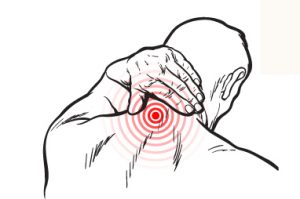 Most likely you have experienced neck pain at some point in your life.
Most likely you have experienced neck pain at some point in your life.
This pain often can be for just a few moments, such as after craning your neck to look at something at an awkward angle. Pain also could last several minutes or hours, such as when you wake up from sleeping with your head in a bad position, like sleeping in a car or on a plane.
Unfortunately, neck pain also can last for days, weeks or even years. Usually, neck pain that lasts for longer periods of time comes from some sort of trauma. For example, it can be due to a contact sport like football, being involved in a motor vehicle collision, or other activities that may lead to a fall (any bull riders out there?).
One of the most often overlooked, but very common causes of neck pain, is poor posture, or when completing some work activities, especially if you work extensively seated at a computer.
Neck pain can arise from many different causes, as well as any of the tissues of the neck. You could have degeneration in the discs, arthritic changes, bone spurs or simply a soft tissue disorder that causes muscular pain.
Other symptoms that can often be associated with neck pain include numbness and tingling, or weakness in the arms and dizziness from a type of vertigo called cervicogenic vertigo. Additional symptoms might be sharp pains with motion of the neck and head, shooting pains in the arms, or tightness and achiness, proving to be more constant in the muscles of the neck.
If you are experiencing neck pain alone, it often can be relieved by simple measures. However, sometimes the pain may require intervention by a health care provider. If you are experiencing neck pain with associated symptoms of shooting pains, numbness or tingling, or weakness in the arms, this could be a sign of a more serious condition. You should consult your physician.
Treatment options can include things that are as simple as cold/hot packs, simple stretches and light exercise, as well as rest. There also are some conditions that may require further treatment, including medications/injections, acupuncture, spine mobilizations or traction. The most severe cases may require surgery.
The most important thing is to have a medical provider assess the pain and start an intervention. You could see a family physician, an orthopedic specialist, a chiropractor, or a physical therapist to assess your needs.
Remember that early intervention typically will help alleviate symptoms more quickly and get you back to doing things you love, without the big pain in the neck.
Spooner Physical Therapy, in North Mesa, is located at 6824 E. Brown Road. To learn more, call (480) 924-5514, or visit spoonerpt.com/locations/north-mesa.

